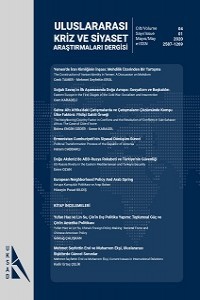Rus Hibrit Savaşı: Teoriden Uygulamaya
Rusya
tıpkı Batılı devletler gibi hibrit savaşla alakalı doktrinler geliştirmeye özen
göstermektedir. Bu bağlamda Rusya; Ulusal Güvenlik Stratejisi, Dış Politika
Konsepti ve Askeri Doktrin örneklerinde olduğu gibi stratejik öneme haiz olan
devlet belgelerinde bu zamana kadar test edilmiş politikalarını vurgulamıştır.
Teorik altyapı; Abhazya, Güney Osetya, Dağlık Karabağ, Transdinyester’de
yapılan askeri operasyonlar sırasında Rusya tarafından “başarıyla”
uygulanmıştır. Komplike hibrit savaş araçlarının pratikte uygulamaya
geçirilmesi, Ukrayna topraklarının işgali ve özellikle de Kırım yarımadasının
yasadışı ilhakı sürecinde gerçekleşmiştir. Küresel bir güvenlik konjonktürünün
Rusya tarafından değiştirilmesi, “hibrit savaş”ı genel bir istikrar için gerçek
bir tehdit haline getirmiştir.
Anahtar Kelimeler:
Hibrit Savaş, Rusya, Kırım, İlhak, Ukrayna, Rusya Askeri Doktrini
Russian Hybrid War: From Theory to Practice
Along with western strategists, Russia made a great contribution to developing hybrid war doctrine; highlighting
and justifying most of the tested tactics in strategically important state
documents such as National Security Strategy, Foreign Policy Concept and Military Doctrine. The theoretical
background was “successfully” implemented by Russia during the military
operations in Abkhazia, South Ossetia,
Nagorny Karabakh, Transnistria; but the
practical implementation of the complex
of tools was demonstrated by invasion into Ukrainian territory, especially the illegal annexation of Crimean
Peninsula. Changing a global security conjuncture by Russia turned “hybrid
warfare” in a real threat to an overall
stability.
Keywords:
Hybrid Warfare, Russia, Crimea, Annexation, Ukraine, Russian Military Doctrine,
___
- Appeal of Mejlis of the Crimean Tatar people to the Verkhovna Rada of Ukraine, QTMM, 2014, http://qtmm.org/новости/4290-обращение-меджлиса-крымскотатарского-народа, (Accessed on 12.09.2017).
- CHEKINOV, Bogdanov, The Nature and Content of a New-Generation War, Military Thought, No: 10, October-December 2013, ISSN 0236-2058, p. 12–23.
- Concept of the Foreign Policy of the Russian Federation Approved by President of the Russian Federation V. Putin on 12th February 2013, Ministry of Foreign Affairs of Russian Federation, Moscow 2013, http://archive.mid.ru//brp_4.nsf/0/76389FEC168189ED44257B2E0039B16D (Accessed on 12.08.2017).
- DIMITRAKOPOULOU, Sophia, “Russia’s National Security Strategy to 2020: A Great Power in the Making?”, Caucasian Review of International Affairs, 4 (1), 2010, http://www.cria-online.org/10_4.html, (Accessed on 12.08.2017), p. 35-42.
- DUBOVITSKY, “Bez neba” (Without Sky), Russkiy Pioner, http://ruspioner.ru/honest/m/single/4131, (Accessed on 15.08.2017).
- EROL, Mehmet, “Hybrid Warfare Studies and Russia’s Example in Crimea”, Gazi Akademik Bakış, 17 September 2015, http://dergipark.ulakbim.gov.tr/gav/article/viewFile/5000159909/5000144268, (Accessed on 12.08.2017), p. 261-277.
- GAREEV, Makhmut Akhmetovich, If War Comes Tomorrow? The Contours of Future Armed Conflict, Translat. Yakov Vladimirovich Fomenko, Frank Cass, London 1998, p. 192.
- GERASIMOV, Valeriy, “General'nyy shtab i oborona strany (General headquarter and defense of the country)”, Voyenno-Promyshlennyy Kur'yer, Issue 4 (522) 5, February 2014, http://vpk-news.ru/articles/18998, (Accessed on 12.08.2017).
- GERASIMOV, Valeriy, “Tsennost’ Nauki V Predvideniyi” (Prevision is What Science is Valued for), Voyenno-Promyshlenniy Kur’yer, No: 8 (476), 27 February-5 March 2013, http://www.vpk-news.ru/articles/14632, (Accessed on 12.08.2017).
- GLENN, “Thoughts on Hybrid Conflict, Small Wars Journal”, 2 March 2009, http://smallwarsjournal.com/mag/docs-temp/188-glenn.pdf, (Accessed on 12.08.2017).
- GRANT, “Hybrid Wars”, Government Executive, http://www.govexec.com/magazine/features/2008/05/hybrid-wars/26799/, (Accessed on 03.09.2017).
- HOFFMAN, Frank, “Conflict in the 21st Century”, Potomac Institute for Policy Studies, Arlington VA 2007, p. 8, http://www.potomacinstitute.org/images/stories/publications/potomac_hybridwar_0108.pdf, (Accessed on 12.08.2017).
- JACKSON, Patrick, “Ukraine crisis: ‘Frozen conflicts’ and the Kremlin”, BBC News, (http://www.bbc.com/news/world-europe-29078541), (Accessed on 12.08.2017).
- KOMSHIAN, Lori, “Russian Foreign Policy and Smart Power”, In Academic Politics, http://prospectjournal.org/2013/01/28/russian-foreign-policy-and-smart-power/, (Accessed on 12.08.2017).
- LEGVOLD, Robert, Russian Foreign Policy in the 21st Century & the Shadow of the Past, Columbia University Press, New York 2007, p. 13.
- PRESIDENTIAL EXECUTIVE OFFICE, “Military Doctrine of Russian Federation approved by V. Putin”, http://static.kremlin.ru/media/events/files/41d527556bec8deb3530.pdf(Accessed on 12.08.2017).
- MONAGHAN, Andrew, “Russia and Eurasia REP 2013/03 The New Russian Foreign Policy Concept: Evolving Continuity”, Chatham House, April 2013, https://www.chathamhouse.org/sites/files/chathamhouse/public/Research/Russia%20and%20Eurasia/0413pp_monaghan.pdf, (Accessed on 12.08.2017).
- MURRAY, Williamson et al., “Hybrid Warfare”, Cambridge University Press, New York 2012, p. 321.
- NEMETH, "Future War and Chechnya: A Case for Hybrid Warfare", Naval Postgraduate School, Monterey California 2002, http://calhoun.nps.edu/bitstream/handle/10945/5865/02Jun_Nemeth.pdf?sequence=1, (Accessed on 12.08.2017).
- NICHUKIN, Alexey, “Putin's Secret Weapon”, 7 June 2014, http://inosmi.ru/russia/20140708/221522044.html, (Accessed on 12.08.2017).
- PIONTKOVSKY, “The ‘New Russia’ Closed: the Following Steps of the Kremlin”, Apostrophe, http://apostrophe.com.ua/article/politics/2015-08-19/proekt-novorossiya-zakryit-sleduyuschie-shagi-kremlya/2128, (Accessed on 12.08.2017).
- PUTIN, “A New Integration Project for Eurasia-the Future That Is Born”, Izvestia, https://iz.ru/news/502761, (Accessed on 18.08.2017).
- RODKIEWICZ, Witold, “The Russian Federation’s foreign policy concept”, ANALYSES 2013-02-20, http://www.osw.waw.pl/en/publikacje/analyses/2013-02-20/russian-federations-foreign-policy-concept, (Accessed on 12.08.2017).
- Security Council of the Russian Federation, “National Security Strategy of the Russian Federation up to 2020, signed on 12, May”, http://www.scrf.gov.ru/documents/99.html, (Accessed on 12.08.2017).
- SLIPCHENKO, Vladimir, “Reforma Bez Kotoroy Ne Oboytis” (An Unavoidable Reform), Voyenno-Promishlenniy Kurier, http://vpk-news.ru/articles/72, (Accessed on 25.08.2017).
- “Strategiya protivodeystviya ekstremizmu v Rossiyskoy Federatsii do 2025 goda” (The Strategy for Countering Extremism in Russian Federation Until 2015), 2014, http://www.scrf.gov.ru/documents/16/130.html, (Accessed on 24.08.2017).
- TRENIN, Dmitri, “Dolzhen li Zapad opasat'sya novoy voyennoy doktriny Rossii?” (Should the West Fear Russia's New Military Doctrine?), 12.01.2015, http://inosmi.ru/world/20150112/225466144.html, (Accessed on 25.08.2017).
- TSYGANKOV, Russia and the West from Alexander to Putin: Honor in International Relations, Cambridge University Press, 2012, p. 100.
- TSYGANKOV, Russia’s Foreign Policy, Rowman & Littlefield Publishers Inc., Oxford 2006, p. 13. YASHIN, Ilya et al., “Putin. War”, 2015, Moscow, http://www.putin-itogi.ru/putin-voina/, (Accessed on 11.10.2017).
- ZEVELEV, “NATO’s Enlargement and Russian Perceptions of Eurasian Political Frontiers” George Marshall European Centre for Security Studies, http://www.nato.int/acad/fellow/98-00/zevelev.pdf, (Accessed on 12.08.2017).
- Başlangıç: 2017
- Yayıncı: Mehmet Seyfettin EROL
Sayıdaki Diğer Makaleler
Cyber Wars: Asymmetry in Threat
KRIZLER VE KRIZ YÖNETIMI: TEMEL YAKLAŞIMLAR
Hibrit Savaş, DEAŞ ve Türkiye’nin Duruşu
HİBRİT SAVAŞ: İRAN SİLAHLI KUVVETLERİ
Bir Vekalet Savaşı Olarak Suriye Krizi ve Büyük Güç Politikalarının Realizme Dönüşü
TERÖR ÖRGÜTÜ PKK/PYD’NİN SURİYE’DE İZLEDİĞİ İÇ SAVAŞ STRATEJİSİNİN DEĞERLENDİRİLMESİ
Firas Elias: Değişen Güvenlik Ortamında Yeni Strateji Dengeleri
